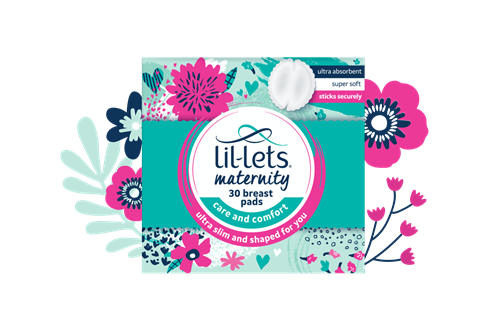Understand the reasons behind leaking breasts, and discover new ways to manage it with confidence.
Pregnancy is an amazing and transformative experience that can bring about remarkable changes in your body.
From morning sickness to a growing belly, it's clear that something incredible is happening inside. One of the most surprising changes for many of us is the sudden occurrence of breast leaks. If you're currently pregnant or planning to be, you may be wondering why this happens, how to manage it, and what it all means for your body. We’re here to help you better understand breast leaks.
Leaking breasts are one of the most common body changes during pregnancy and it’s rarely anything to be concerned about. Most of the time, the nipples are leaking a substance called colostrum — the first milk supply in the breasts made in preparation for feeding your baby. This typically starts to happen a few months or weeks before the baby is due. In the meantime, you can wear absorbent breast pads/nursing pads in your bra to absorb the milk. They’re designed to fit comfortably in the cup of the bra. We recommend keeping some breast pads in your maternity hospital bag too.
Whether you're a new mum, or someone who has never been pregnant, it's important to know that leaking clear fluid from your breasts is a common occurrence. This fluid, which is usually not a cause for concern, may be the result of hormonal changes, medication, or even something as simple as friction from your clothing. The clear and watery fluid is typically colostrum or galactorrhoea — which is the first drops of breast milk or milky nipple discharge respectively.

To manage leaking breasts, you can use absorbent breast pads/nursing pads in your bra to absorb the milk. These pads are designed to fit comfortably in the cup of the bra, keeping you dry and comfortable. Here are some tips:
After pregnancy, there are several other reasons why you might have leaking breasts. And it’s a mix of physical and emotional triggers.
Here are some common examples:
Waking up to find that your bed sheets are wet can be an uncomfortable experience, but it's not uncommon for people to experience breast leaking at night. Of course, breast leaks can happen at any time of day, but they occur more frequently at night due to changes in posture, hormone levels, and milk production. While you’re asleep, your breasts might start leaking because of the let-down reflex — a powerful and normal part of the breastfeeding process. A build-up of prolactin and oxytocin hormones is released into the bloodstream throughout the night. Prolactin aids milk production and oxytocin causes the breasts to push out the milk. As a result, there is an oversupply of milk that leads to leaks. However, leaking should improve as your body adjusts to breastfeeding over time.

Generally speaking, your breast milk will gradually dry up if you’re not breastfeeding. Once you have stopped breastfeeding, it usually takes 7-10 days for your hormones to regulate, but that doesn’t mean you won’t experience a few leaks in this timeframe.
There are several reasons behind leaking breasts when you aren’t pregnant. It depends on factors such as age, health status, and medication use. If you have leaking breasts while not pregnant, we highly recommend consulting a doctor to rule out any serious causes and to get started with the relevant treatments.
Here are some common reasons why people have leaky breasts when they’re not pregnant:
Whether you're dealing with daytime leaks, night-time leaks, or both, there are plenty of ways to manage this and feel like yourself again. From wearing a supportive bra to using breast pads, the solutions are within reach. And if you’re still a little worried about leaking breasts and think it might have nothing to do with pregnancy, speak to a healthcare professional for specialised guidance.
*https://www.nhs.uk/start4life/pregnancy/week-by-week/1st-trimester/week-7 [Accessed: 16 March 2023]
** https://anya.health/breastfeeding-uk/ [Accessed: 21 February 2023]
Vaginal discharge is completely normal during pregnancy and often increases due to hormonal changes, especially rising oestrogen and increased blood flow to the vaginal area. It also plays a crucial role in keeping the vagina clean and preventing infections.
Vaginal Discharge In PregnancyThe second trimester is often brings relief as many early symptoms like nausea and fatigue start to ease, and you may begin to feel more energetic. This is also when your baby grows rapidly, and you may start to feel their movements!
The 2nd Trimester - What To ExpectWritten by Lara Taylor, Specialist Midwife
So, you’ve recently found out you’re pregnant and I’m sure you’re experiencing a mix of emotions.
Changes To Your Body In Early Pregnancy
It’s difficult to determine exactly when your breasts will stop leaking. However, most mums find that their breasts stop leaking milk in the first 6 to 10 weeks of breastfeeding once the body has adjusted to the baby’s needs and feeding schedule.
There are several body changes that can occur during pregnancy. The most common changes include breast leaks, large and tender breasts, swelling, muscle pain and weight gain.
Leaking breasts typically mean that you are ready to start breastfeeding. However, it may also be a result of hormonal changes caused by medication, contraceptive pills or underlying medical conditions.
Breasts can leak milky fluid due to a variety of reasons, including hormonal changes, menstruation, medication side effects, or even physical stimulation. If you have concerns about breast leakage because you’re not pregnant and you don’t have a baby, it's always a good idea to speak with a healthcare professional for further evaluation as this could be linked to conditions such as galactorrhea, hyperlactation and mastitis.
Leaking breasts are not necessarily a sign of labour. However, you may find that you have started to produce and leak more milk closer to labour.